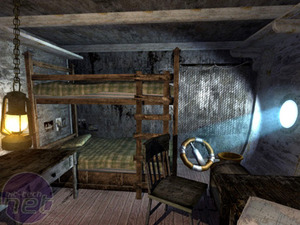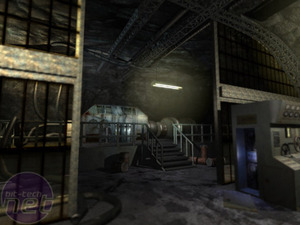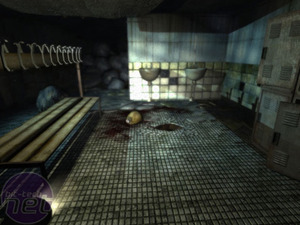Got Game?
Penumbra is a game I’ve talked about before, so I hope you’ll forgive me if I gloss over some of the larger game elements (such as the plot) and focus on the interactions instead.In many ways Penumbra: Overture is the perfect game for the Novint Falcon because so much of it is based around the use of physics. Even without the Falcon the game requires a canny understanding of real-world reactions – players use the mouse to interact with the world and manipulate the environment.
If there’s a fence in your path or a padlock on the door then often the only way to progress is to use the mouse to make a new path or to swing the mouse and bust the padlock off.
This new version of Penumbra updates this mechanic and replaces the mouse with the more involving input, the Falcon. With this, the player can now access another axis, enabling them to reach out and actually pick items up that are far away from them.
The game, which is a survival-horror/physics puzzler at its core, begins to take on a few more interesting game mechanics. Endurance, for example, becomes as much a part of the game as anything else and in a very good way. When you know that you have to actually pick up and literally carry a lantern with you if you want to have the best view of your surroundings then you’ll find yourself struggling to decide about whether to make the effort or risk the darkness.
Testing the Falcon, it was here that I noticed just how closely the Falcon monitors the game too – running down a dark hallway with the lantern in my right hand, I could actually feel it swing with each step. I could feel the momentum move it around as I stopped moving. I could feel the weight of it shifting about as I turned a corner and I found myself trying to accurately gauge my aim as I threw it into darkened rooms.
One of the claims made by the fellows at Novint is that the controller requires gamers to use and develop real-world skills such as muscle memory and hand-eye coordination in order to succeed. That’s almost certainly true – from being able to gauge throws and complex melee attacks right through to just being able to gauge depth properly in a game so that you know where you’re reaching.
The ability to feel different textures is one which seeps into Penumbra too and makes the game feel yet more alive. The game is predominantly set in an underground bunker where most every surface is wood, soil, rock or metal and I can happily report that each surface has its own texture when touched.
The game is designed to use physics at every turn and the use of physical textures complements this perfectly. Opening a door is no longer a matter of just moving the mouse forward, clicking, holding and pulling. It’s now a matter of reaching out with your hand, feeling the texture of the door by running your hand over it to get a feel for how strong it might be, gripping it (literally, pressing a button by gripping the knob) and then pulling the door open.
It’s exhilarating to know that if a monster is on the other side and tries to force the door open then not only will you be able to feel the texture of the door, but that it’ll only be your strength keeping him out as you hold the door shut.
Speaking of monsters, I’ll take this moment to share with you the most important thing the Falcon taught me. That is: poking dead zombie dogs is gross. I mean, really gross, so much so that it feels all soft, squidgy and rubbery. You push on it and you can feel fetid flesh pushing back gentle against you. It’s disgusting, but part of you has to do it because you just have to check if the dog is really dead or just pretending. With those crazy Swedes at Frictional games, you never know for sure.

MSI MPG Velox 100R Chassis Review
October 14 2021 | 15:04














Want to comment? Please log in.